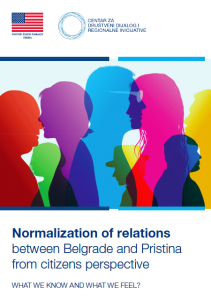Serbian Public: Two Acceptable Scenarios for Belgrade-Pristina Dialogue
What is usually left out from the contemporary debate on reaching a comprehensive agreement in the dialogue between Belgrade and Pristina is understanding of “hearts and minds” of citizens, in this case Serbian citizens. With the motivation to enrich the debate, Center for Social Dialogue and Regional Initiatives and SPRINT – Insights Agile Market Research have conducted a research on the Serbian public preferences and feelings connected to the Dialogue and the Kosovo issue. The research was done in the period form September 23-30, 2019, on a sample size of 1.173 respondents which demographically resembles the latest census data for Serbia.
Milan Krstić, Teaching Assistant and PhD Candidate at the University of Belgrade – Faculty of Political Science, opened the event with the brief introduction on the research goals and purposes. He said that the aim was to understand the meaning and importance of Kosovo for citizens of Serbia. At the same time, researchers wanted to analyze public preferences when it comes to the outcome of the dialogue and reaching the comprehensive agreement.
“We wanted to determine which potential scenario of the agreement is most or least favorable among the Serbian public,” Krstić added.
The results were presented by the founder of Sprint, Nikola Jović, who is also PhD Candidate and Teaching Assistant at the Faculty of Political Science in Belgrade. He has presented the methodology of the extensive survey, as well as the key insights. The central findings were focused on the personal preferences and feelings of the citizens towards the Dialogue, but also the scope of their support for President Vučić’s policies towards Kosovo.
One of the crucial conclusions was that there is strong emotional attachment to Kosovo, based on the long standing narratives that represent Kosovo as “heart of Serbian state” and “Serbian identity”. In accordance with that, recognition of the Kosovo independence would be considered “national treason” by the majority and would invoke emotional feelings of “betrayal and disappointment”.
Jović also presented seven different potential scenarios of the agreement, which were offered in the questionnaire in order to examine the public support for each of them. The survey results showed that only two scenarios would have certain amount of support among the citizens:
- Maximalist scenario: Serbia recognizes Kosovo, but gains territories north of Ibar, while Kosovo concedes Community of Serb Municipalities in south with SOC monasteries getting extraterritoriality.
- No recognition scenario: Serbia does not recognize Kosovo independence formally, but accepts Kosovo membership in UN.
While the results showed that the public is generally not familiar with Vučić’s actual policy towards Kosovo, it was also evident that Vučić fails to muster the support for the agreement by producing two different simultaneous narratives. As the result of the government-affiliated media propaganda, the government supporters are more leaning towards the no-recognition scenario, while, at the same, Vučić tends to persuade the Serbian public that it needs to take a more realistic position in reaching the final agreement.
The concluding remarks of the panel offered a consensual presumption that the long-standing narratives have enhanced the ethnic distance and nationalistic feelings among the Serbian public. The emotions are the crucial driving force behind the decision making of the Serbian voting body, which makes it more difficult to reach an agreement without invoking strong feelings and reactions within the Serbian public.









